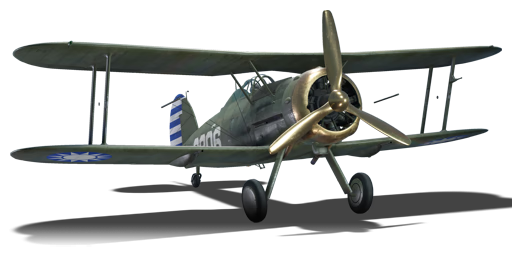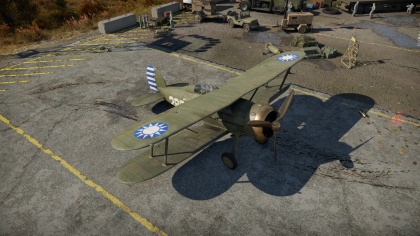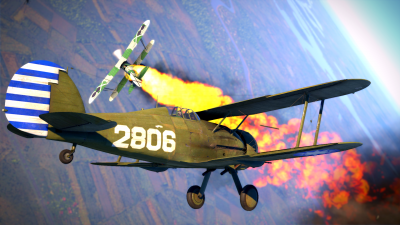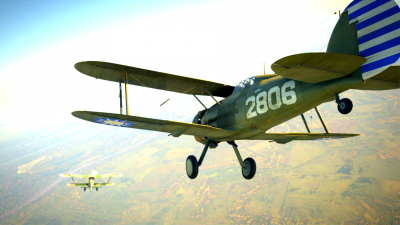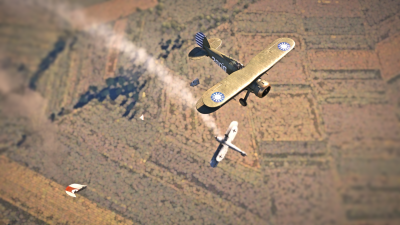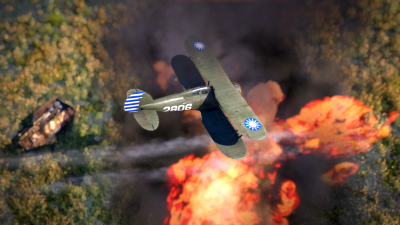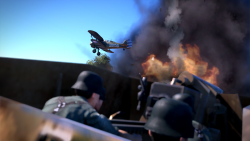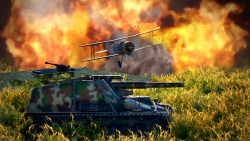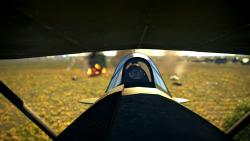Difference between revisions of "Gladiator Mk I (China)"
(→Flight performance) (Tag: Visual edit) |
TiMe_tO_FaiL (talk | contribs) (Added little to survivability (self-sealing fuel tanks)) (Tag: Visual edit) |
||
| Line 102: | Line 102: | ||
<!-- ''Examine the survivability of the aircraft. Note how vulnerable the structure is and how secure the pilot is, whether the fuel tanks are armoured, etc. Describe the armour, if there is any, and also mention the vulnerability of other critical aircraft systems.'' --> | <!-- ''Examine the survivability of the aircraft. Note how vulnerable the structure is and how secure the pilot is, whether the fuel tanks are armoured, etc. Describe the armour, if there is any, and also mention the vulnerability of other critical aircraft systems.'' --> | ||
| − | Like many aircraft just prior to the break out of World War II, the Gladiator Mk I was not outfitted with any armour plating. The Gladiator Mk I relied on its engine to get the aircraft where it needed to go and helped the aircraft get into a position where the guns should shoot down an enemy, any attempts to install armour plating would have only slowed down the already relatively slow biplane which would not have been worth the trade-off. | + | Like many aircraft just prior to the break out of World War II, the Gladiator Mk I was not outfitted with any armour plating. The Gladiator Mk I relied on its engine to get the aircraft where it needed to go and helped the aircraft get into a position where the guns should shoot down an enemy, any attempts to install armour plating would have only slowed down the already relatively slow biplane which would not have been worth the trade-off. However, despite lacking armor, its fuel tank is self-sealing. |
| − | To maintain the centre of balance for this fighter, the pilot, fuel tank and engine take up the fuselage from the middle to the front, any attacks on this aircraft in this zone risk hitting a critical component, ending the Gladiator Mk I's fight in the battle earlier than expected. Though a closed cockpit may offer the pilot protection from glancing shots, it will not do much for head-on or side attacks. | + | To maintain the centre of balance for this fighter, the pilot, fuel tank and engine take up the fuselage from the middle to the front, any attacks on this aircraft in this zone risk hitting a critical component, ending the Gladiator Mk I's fight in the battle earlier than expected. Though a closed cockpit may offer the pilot protection from glancing shots, it will not do much for head-on or side attacks. |
== Armaments == | == Armaments == | ||
Revision as of 02:17, 2 June 2020
Contents
| This page is about the fighter Gladiator Mk I (China). For other versions, see Gladiator (Family). |
Description
The ␗Gladiator Mk I is a rank I Chinese fighter
with a battle rating of 1.0 (AB/RB/SB). It was introduced in Update 1.91 "Night Vision".
General info
Flight performance
Describe how the aircraft behaves in the air. Speed, manoeuvrability, acceleration and allowable loads - these are the most important characteristics of the vehicle.
| Characteristics | |||||||
|---|---|---|---|---|---|---|---|
| Stock | |||||||
| Max Speed (km/h at 4,420 m) |
Max altitude (meters) |
Turn time (seconds) |
Rate of climb (meters/second) |
Take-off run (meters) | |||
| AB | RB | AB | RB | AB | RB | ||
| 399 | 386 | 10211 | 16.7 | 17.7 | 13 | 13 | 232 |
| Upgraded | |||||||
| Max Speed (km/h at 4,420 m) |
Max altitude (meters) |
Turn time (seconds) |
Rate of climb (meters/second) |
Take-off run (meters) | |||
| AB | RB | AB | RB | AB | RB | ||
| 431 | 414 | 10211 | 15.3 | 16.0 | 18.8 | 15.7 | 232 |
Details
| Features | ||||
|---|---|---|---|---|
| Combat flaps | Take-off flaps | Landing flaps | Air brakes | Arrestor gear |
| X | ✓ | ✓ | X | X |
| Limits | ||||
|---|---|---|---|---|
| Wing-break speed (km/h) |
Gear limit (km/h) |
Combat flaps (km/h) |
Max Static G | |
| + | - | |||
| 520 | ~11 | ~5 | ||
| Optimal velocities | |||
|---|---|---|---|
| Ailerons (km/h) |
Rudder (km/h) |
Elevators (km/h) |
Radiator (km/h) |
| < 240 | < 180 | < 330 | > 190 |
| Compressor (RB/SB) | ||
|---|---|---|
| Setting 1 | ||
| Optimal altitude | 100% Engine power | WEP Engine power |
| 4,100 m | 810 hp | 850 hp |
Survivability and armour
Like many aircraft just prior to the break out of World War II, the Gladiator Mk I was not outfitted with any armour plating. The Gladiator Mk I relied on its engine to get the aircraft where it needed to go and helped the aircraft get into a position where the guns should shoot down an enemy, any attempts to install armour plating would have only slowed down the already relatively slow biplane which would not have been worth the trade-off. However, despite lacking armor, its fuel tank is self-sealing.
To maintain the centre of balance for this fighter, the pilot, fuel tank and engine take up the fuselage from the middle to the front, any attacks on this aircraft in this zone risk hitting a critical component, ending the Gladiator Mk I's fight in the battle earlier than expected. Though a closed cockpit may offer the pilot protection from glancing shots, it will not do much for head-on or side attacks.
Armaments
Offensive armament
The Gladiator Mk I (China) is armed with:
- 2 x 7.7 mm Browning .303 machine guns, fuselage-mounted (600 rpg = 1,200 total)
- 2 x 7.7 mm Browning .303 machine guns, wing-mounted (400 rpg = 800 total)
The Gladiator Mk Is arrived in China with the standard 7.7 mm Browning machine guns, two of which were mounted on each side of the pilot within arm's reach and the other two were mounted one under each side of the lower wing. It is important for pilots of this aircraft to determine at what distance they typically engage enemy aircraft at as convergence of the machine guns is a necessity to manage to effectively put as many bullets as possible into the enemy fighter. Typically in biplanes, a closer convergence setting of 100 to 250 m is best for close-in fighting, typically as one gets farther out from there, bullets lose some of their punch.
Many ace pilots from all sides of the war stated that when the enemy filled the windscreen, there was no way you could not hit, thereby guaranteeing a hit and conserving ammunition. The Gladiator Mk I does not have the machine-gun firing speed of those found on some Russian biplanes as it is necessary to synchronize the firing of the guns in the fuselage to fire through the propeller arc. With 2,000 rounds of ammunition distributed between all four machine guns, it is recommended to fire in short bursts, mainly to prevent overheating and jamming of the machine guns. Typically you can continuously fire about 750 rounds of ammunition before the guns jam up and require a cool down before they can be used again.
When possible, change out the default ammunition belts for either tracer belts which are very effective against other biplanes, especially those which have fabric coverings and non-self sealing fuel tanks as tracer rounds have a good chance of setting planes on fire which can rarely put the flames out. Air belts are another good choice due to the explosive filler in the round which helps to damage or disable aircraft faster than regular bullets. For those pilots who like to sneak into a fight and catch enemy aircraft unaware, stealth belts are the way to go as there are no tracer rounds to give away your position. The enemy pilots tend to realize where the stealth bullets are coming from only too late as their aircraft is coming apart and falling to the ground.
Usage in battles
The Gladiator Mk I (China) is a typical turn-fighter biplane and should be played as such. This aircraft's manoeuvrability lends it to be able to do well turning and also do especially well when doing a loop as the aircraft has good control coming out of the loop enabling the pilot to get guns on an enemy target which may have stalled below or may have peeled off going for another target. Flaps help the Gladiator Mk I (China) to decrease its turn time and should be used when necessary or a little extra advantage is needed, however, care must be taken not to overuse them as they drastically reduce the aircraft's speed. Though not equipped with any suspended ordnance of bombs or rockets, the four machine guns will typically make short work of ground targets and the ability for this aircraft to fly at slow speeds and quickly turn around makes it an effective ground attacker.
Manual Engine Control
| MEC elements | ||||||
|---|---|---|---|---|---|---|
| Mixer | Pitch | Radiator | Supercharger | Turbocharger | ||
| Oil | Water | Type | ||||
| Controllable | Not controllable Not auto controlled |
Not controllable Not auto controlled |
Not controllable Not auto controlled |
Separate | Not controllable 1 gear |
Not controllable |
Modules
| Tier | Flight performance | Survivability | Weaponry | |
|---|---|---|---|---|
| I | Fuselage repair | Radiator | Offensive 7 mm | |
| II | Compressor | Airframe | New 7 mm MGs | |
| III | Wings repair | Engine | ||
| IV | Engine injection | Cover | ||
Pros and cons
Pros:
- Armament is equal to or better than other fighters it typically faces
- Good manoeuvrability in a turn, fantastic looper
- Tracer belts, like all other planes fitted with Browning machine guns, can be deadly
- Has flaps, unlike most other biplane fighters
- Sufficient ammunition prevents frequent reloads or landing to rearm
Cons:
- Performance deficiencies can make it an easy target for experienced pilots or more difficult adversaries
- Not the best climber
- Bleeds speed in turns, especially when using flaps
- In simulator mode, upper wing blocks a significant amount of the forward view
History
Describe the history of the creation and combat usage of the aircraft in more detail than in the introduction. If the historical reference turns out to be too long, take it to a separate article, taking a link to the article about the vehicle and adding a block "/History" (example: https://wiki.warthunder.com/(Vehicle-name)/History) and add a link to it here using the main template. Be sure to reference text and sources by using <ref></ref>, as well as adding them at the end of the article with <references />. This section may also include the vehicle's dev blog entry (if applicable) and the in-game encyclopedia description (under === In-game description ===, also if applicable).
Media
- Images
- Videos
See also
- Other variants in-game
- Aircraft of comparable role, configuration and era
External links
Paste links to sources and external resources, such as:
- topic on the official game forum;
- encyclopedia page on the aircraft;
- other literature.
| Gloster Aircraft Company, Limited | |
|---|---|
| Fighters | Gladiator Mk II · Sea Gladiator Mk I · Gladiator Mk IIF · Gladiator Mk IIS · Tuck's Gladiator Mk II |
| Jet Fighters | Meteor F Mk 3 · Sea Meteor F Mk 3 · Meteor F Mk 4 G.41F · Meteor F Mk 4 G.41G · Meteor F Mk 8 G.41K · Meteor F Mk.8 Reaper |
| Javelin F.(A.W.) Mk.9 | |
| Export | J8A · Iacobi's J8A · ␗Gladiator Mk I · ▄Gladiator Mk I |
| ▄Meteor F Mk.8 · Meteor F.8 · Meteor NF.13 | |
| See Also | Fokker |
| China fighters | |
|---|---|
| British | ␗Gladiator Mk I |
| French | D.510C |
| Japanese | ␗A6M2 · ␗Ki-27 otsu · ␗Ki-43-III ko · ␗Ki-44-II hei · ␗Ki-61-I otsu · ␗Ki-84 ko |
| American | CW-21 · Hawk III · P-66 · ␗P-40E-1 · H-81A-2 · ␗P-43A-1 |
| ␗P-47D-23-RA · ␗P-47D-30 · ␗F-47N-25-RE · ␗P-51C-11-NT · ␗P-51D-20 · ␗P-51K | |
| Soviet | ␗I-15bis · ␗I-153 M-62 · ␗I-16 Chung 28 · ␗I-16 type 5 · ␗I-16 type 10 · ␗I-16 type 17 · ␗La-11 · ␗La-9 |


